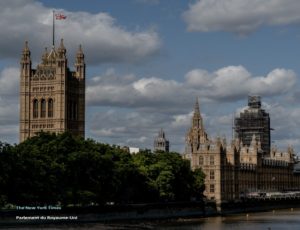The United Kingdom has just updated its global list of individuals under sanctions, but has decided not to reproduce the list of four Burundian officials sanctioned by the European Union. Burundi remains, however, under sanctions. (Le Mandat)
Following the renewal of sanctions against Burundi last December, the UK believes that it is not appropriate to target individuals at this time. No Burundians are on the new sanctions list drawn up on Monday. However, the sanctions imposed on the Gitega government by the UK have their origins in those imposed by the European Union on four Burundians before and even after the Brexit. It was around this very issue of sanctions against Burundi that the House of Lords held a debate on 19 January. “In response to the improved political climate in Burundi, we have decided not to move specific individual designations under the EU sanctions regime to the UK’s autonomous sanctions regime in Burundi,” said Andrew Michael Gordon Sharpe, who welcomed the Burundian government’s “closer cooperation with the international community during 2021”. “We also note, for example, that the government has re-engaged with some of the media. We welcome this increased commitment to human rights.
Other members of this upper house of the UK parliament believe that these sanctions are instead driving the already extremely poor Burundian people into misery. Among them, John Dawson Eccles. According to him, there is abject poverty in much of Burundi. For John Dawson Eccles, it does not seem very relevant that the UK’s policy towards Burundi is guided by sanctions. “If we think about sub-Saharan Africa, with all its problems, and relate them to Burundi, the central issue is economic development, not the behavior of a particular government at a particular time.”
For their part, other members of the upper house of parliament believe that maintaining the sanctions regime without naming anyone under it seems totally ineffective. “We express great concern about the decision to remove named individuals from the sanctions regime in relation to Burundi, even though in principle the sanctions regime potentially remains in place,” said Lindsay Patricia Northover, adding that the UK sanctions regime must be clearly responsive. Citing the recent report of the UN Commission of Inquiry on Burundi, Lindsay Patricia Northover said that despite the accession to power of a new president of the Republic, repression against civil society and the opposition has continued in Burundi, including summary executions, arbitrary arrests, killings and disappearances.
In conclusion, sanctions presenter Andrew Michael Gordon Sharpe stressed that the current sanctions regime retained the same effects as the previous one and that the UK government was negotiating the re-establishment of cooperation between Burundi and the UN human rights mechanisms. He referred in particular to the UN High Commissioner’s Office which has been forced by the Burundian government to pack up in February 2019 and the UN Special Rapporteur on the situation of human rights in Burundi who will be appointed in March. “We continue to call on the government of Burundi to cooperate with all UN human rights mechanisms and to facilitate the reopening of the office of the UN High Commissioner for Human Rights in Burundi. We want to see Burundi fully engage with the UN human rights mechanisms and allow the Special Rapporteur to enter the country.
While reserving the right to target individuals where necessary, the UK explains that sanctions on Burundi are maintained to encourage the government to respect democratic principles and institutions, the rule of law and good governance, to refrain from policies or activities that repress civil society, to comply with international human rights law and to respect human rights, including in particular, to respect the right to life of persons in Burundi, the right of persons to be free from torture and cruel, inhuman or degrading treatment or punishment, including in relation to rape, other forms of sexual violence and gender-based violence The UK also demands the right to liberty and security of persons including the right not to be arbitrarily arrested, detained or subjected to enforced disappearance; the rights of journalists, human rights defenders and others in Burundi to freedom of expression and peaceful assembly.
These sanctions imposed on the Government of Burundi by the UK exclude, however, the requirement to negotiate with its political opponents. The UK considers that, while political tensions remain, this is no longer an immediate political crisis following “the managed and largely peaceful transfer of power to a new President of the Republic following the May 2020 elections”.

